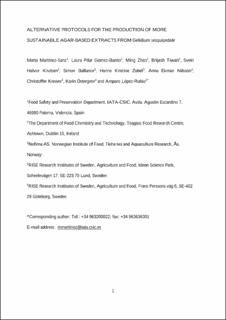| dc.contributor.author | Martinez-Sanz, Marta | |
| dc.contributor.author | Gomez-Barrio, Laura Pilar | |
| dc.contributor.author | Zhao, Ming | |
| dc.contributor.author | Tiwari, Brijesh | |
| dc.contributor.author | Knutsen, Svein Halvor | |
| dc.contributor.author | Ballance, Simon | |
| dc.contributor.author | Zobel, Hanne | |
| dc.contributor.author | Nilsson, Anna Ekman | |
| dc.contributor.author | Krewer, Christoffer | |
| dc.contributor.author | Östergren, Karin | |
| dc.contributor.author | Lopez-Rubio, Amparo | |
| dc.date.accessioned | 2021-10-01T07:29:13Z | |
| dc.date.available | 2021-10-01T07:29:13Z | |
| dc.date.created | 2021-06-10T11:25:10Z | |
| dc.date.issued | 2021 | |
| dc.identifier.citation | Algal Research. 2021, 55 . | |
| dc.identifier.issn | 2211-9264 | |
| dc.identifier.uri | https://hdl.handle.net/11250/2786852 | |
| dc.description.abstract | Agar-based extracts from Gelidium sesquipedale were obtained by applying a conventional hot water treatment and alternative ultrasound- and microwave-assisted methods, with and without the application of an alkaline pre-treatment. The alkaline pre-treatment produced refined extracts with higher purity; however, extraction yields increased from 2–5% to 7–19% by omitting this step. In particular, the ultrasound-assisted extraction allowed reducing 4-fold the extraction time, while keeping constant or even increasing the yield (up to 19% for the 1 h extraction) with respect to the conventional protocol. Interestingly, the presence of proteins and polyphenols conferred the semi-refined extracts a relatively high antioxidant capacity (19–24 μmol TE/g extract). The refined extract produced by the standard protocol formed the strongest hydrogels (>1000 g/cm2). On the other hand, the semi-refined extracts produced by the alternative protocols formed slightly stronger hydrogels (337–438 g/cm2) than the refined counterparts (224–311 g/cm2), due to their greater molecular weights of the former ones. LCA assessment showed lower global warming potential for the semi-refined extracts, especially the ultrasound-assisted extraction, hence highlighting the potential of this method to produce more sustainable agarbased extracts for food-related applications. | |
| dc.language.iso | eng | |
| dc.subject | Phycocolloids | |
| dc.subject | Phycocolloids | |
| dc.subject | Seaweed | |
| dc.subject | Seaweed | |
| dc.subject | Microwaves | |
| dc.subject | Microwaves | |
| dc.subject | Gelidium sesquipedale | |
| dc.subject | Gelidium sesquipedale | |
| dc.subject | Ultrasounds | |
| dc.subject | Ultrasounds | |
| dc.title | Alternative protocols for the production of more sustainable agar-based extracts from Gelidium sesquipedale | |
| dc.type | Peer reviewed | |
| dc.type | Journal article | |
| dc.description.version | submittedVersion | |
| dc.source.pagenumber | 10 | |
| dc.source.volume | 55 | |
| dc.source.journal | Algal Research | |
| dc.identifier.doi | 10.1016/j.algal.2021.102254 | |
| dc.identifier.cristin | 1915035 | |
| dc.relation.project | EC/H2020/SUSFOOD2 | |
| dc.relation.project | Nofima AS: 12335 | |
| dc.relation.project | Norges forskningsråd: 284291 | |
| cristin.ispublished | true | |
| cristin.fulltext | preprint | |
| cristin.qualitycode | 1 | |
